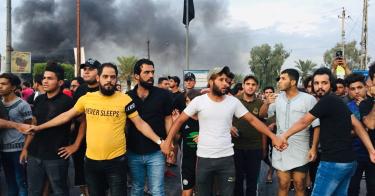Iraq has been convulsed for the last week by widespread popular protests against government corruption, high unemployment, and inadequate government services. The risk grows that escalating violence associated with the protests could bring down Prime Minister Adel Abdul Mahdi’s weak coalition government.
The protesters, mainly in Baghdad and the Shiite-dominated south, are largely young people denouncing high rates of youth unemployment, endemic corruption, and poor public services.
Over the past week, the message has evolved into a demand for the ouster of the government, and the response from security officials has escalated. More than 100 protesters have been killed and thousands injured as security forces used live ammunition, tear gas, and rubber bullets to disperse the crowds.
The Iraqi government’s efforts to contain the chaos have been ineffective. After the protests first broke out Oct. 1, authorities blocked access to about 75% of the internet and imposed a round-the-clock curfew in Baghdad and other southern cities in an attempt to calm the streets. But the protests have mushroomed.
The prime minister has proposed reforms, but they are unlikely to satisfy the protesters, many of whom are young Shiite men who chafe at the self-serving actions of the predominantly Shiite political parties that dominate his coalition government.
The protesters have drawn support from some religious leaders and opposition figures. Iraq’s top Shiite leader, Grand Ayatollah Ali al-Sistani, has supported the demands of the protesters and called for an end to the violence “before it is too late.” Sistani, a traditional religious leader who opposes Iran’s theocratic political system, has been critical of Iraqi political parties in the past.
Muqtada al-Sadr, a powerful Shiite cleric who leads the largest faction within the coalition government, quickly distanced himself from Abdul Mahdi and called for early elections.
The protesters have aired many legitimate grievances, particularly about party members exploiting their positions in government ministries to siphon off resources for their own political supporters and family networks.
Other protesters are motivated by resentment over Iranian influence, which is seen as a threat to Iraqi sovereignty.
Some protesters have carried pictures of Abdul Wahab al-Saadi, a hero of the war against ISIS, who was dismissed as the deputy commander of Iraq’s counterterrorism forces. There is widespread suspicion Iran used its influence to sideline Saadi and other independent or nationalist security officials it cannot control.
The protests may bring down Abdul Mahdi, but the prime minister’s successor likely will remain as mindful of Iranian preferences as he has been.
The United States should recognize the legitimacy of the grievances behind the protests, support the right of the protesters to demonstrate peacefully, call for restraint by Iraqi police and internal security forces, and press the Baghdad government to halt the ongoing purge of security officials that Tehran perceives as being too independent.
Iraq’s wave of protests likely will continue and could become even more violent. Washington’s message should be that Iraq’s leaders should support long overdue reforms if they wish to retain popular legitimacy.
This piece originally appeared in The Daily Signal



